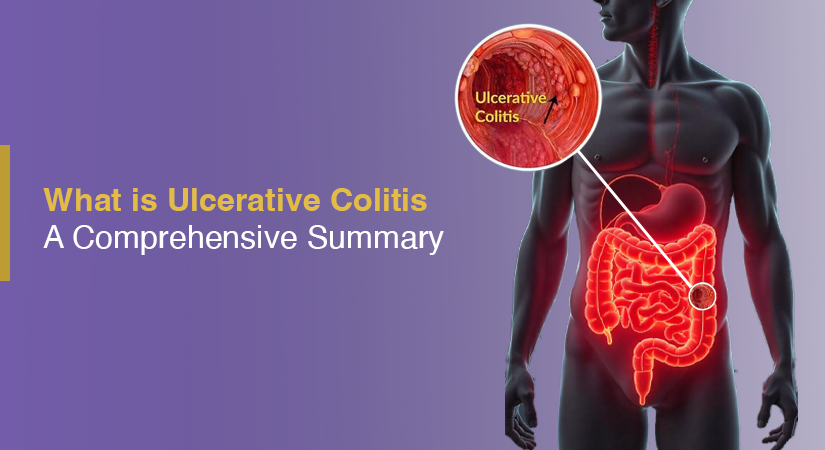Ulcerative colitis (UC) is a chronic, inflammatory bowel disease (IBD) characterised by continuous inflammation of the colonic lining, beginning in the rectum and potentially extending proximally throughout the entire colon. UC is limited to the colon and involves only the superficial layers.
UC is a relapsing-remitting condition, meaning it alternates between periods of active disease (flares) and times of little or no symptoms (remission). Its onset can be gradual or sudden, and the severity can range from mild discomfort to life-threatening complications.
When your gut doesn’t feel good, nothing else feels right. Pain, bloating, and unpredictable bowel movements can make you feel helpless. It’s not just physical; it impacts your confidence, routines, and relationships. Many people live with chronic digestive discomfort without knowing that a condition like ulcerative colitis could be the cause, and that it’s treatable.
What are the symptoms of UC? How do I know if I have UC?
The clinical presentation of ulcerative colitis depends on the extent and severity of the disease. Symptoms may develop gradually or suddenly and may vary from person to person.
- Intestinal Symptoms
- Bloody diarrhoea: This is the hallmark symptom, often with mucus.
- Abdominal pain: Commonly crampy and located in the lower left quadrant.
- Urgency and pain during defecation: Sudden urge to defecate and a feeling of incomplete evacuation.
- Increased frequency of bowel movements: Often more than six times per day during flares.
- Passage of stools in sleep causes extreme discomfort and may disrupt sleep.
2. Generalised Symptoms
- Fever
- Fatigue
- Weight loss
- Anaemia: Due to chronic blood loss and inflammation.
3. Problems outside of the intestine:
UC is associated with systemic inflammation that can affect other organs:
- Arthritis: Especially peripheral joints.
- Uveitis and episcleritis: Eye inflammation.
- Erythema nodosum and pyoderma gangrenosum: Skin manifestations.
- Primary sclerosing cholangitis (PSC): A liver disease that can occur in association with UC.
Why did I get UC? What are the Causes and Risk Factors?
The exact cause of ulcerative colitis remains unknown. It is believed to be the result of a complex interplay of genetic, environmental, immune-related, and microbial factors.
Here are some key contributors:
- Genetic Factors
- Family history increases the risk significantly. First-degree relatives of individuals with UC are at a higher risk.
2. Immune System Dysfunction
- UC is thought to be an autoimmune condition, where the immune system inappropriately attacks the lining of the colon.
3. Environmental Factors
- Geography: More common in industrialised countries, particularly in North America and Northern Europe.
- Diet: High-fat and high-sugar diets, low intake of fruits and vegetables, and excessive red meat consumption may increase risk.
- Smoking: Interestingly, UC is less common in smokers. Some studies suggest that smoking may have a protective effect against UC.
- Hygiene hypothesis: Overly sterile environments may lead to immune system dysregulation.
4. Gut bacteria
- Alterations in the diversity and composition of intestinal bacteria (dysbiosis) have been noted in UC.
- A reduction in beneficial bacteria and an increase in harmful species may contribute to inflammation.
How is Ulcerative Colitis Diagnosed?
The diagnosis of UC is based on a combination of clinical evaluation, laboratory tests, imaging, and endoscopic examination with biopsy.
- Laboratory Tests
- Complete blood count (CBC): May show anaemia or elevated white blood cell count.
- C-reactive protein (CRP) and ESR: Markers of inflammation.
- Fecal calprotectin: Elevated in intestinal inflammation.
2. Endoscopy
- Colonoscopy with biopsy: The gold standard. Shows continuous inflammation beginning in the rectum. Biopsies confirm mucosal inflammation and rule out infections or dysplasia.
3. Imaging
- Abdominal X-rays or CT scans: To assess complications like toxic megacolon or perforation.
Types of Ulcerative Colitis
UC is classified by the extent of colonic involvement:
- Ulcerative proctitis: Inflammation limited to the rectum.
- Left-sided colitis: Extends from the rectum to the splenic flexure.
- Pancolitis: Involves the entire colon.
Do I need treatment for UC? Will I need surgery?
The goal of treatment is to induce and maintain remission, reduce symptoms, and improve quality of life. Therapy depends on disease severity and extent.
The main objective is to suppress inflammation, assist in healing, and sustain remission for as long as possible.
Conclusion
Ulcerative colitis can be a chronic condition, but it doesn’t have to dominate your life. With early diagnosis, an appropriate treatment regimen, and frequent medical check-ups, most individuals can successfully control their symptoms and lead a good quality of life.
Knowing your body, monitoring symptoms, and steering clear of personal triggers can help minimise flare-ups. From medication to diet to surgery, regular contact with your doctor is necessary to get appropriate care at any point.
If you have symptoms of ulcerative colitis or suspect you might, consult a Ulcerative Colitis Specialist at Chirag Hospitals to begin appropriate care.
Continue reading here to know more about: Ulcerative Colitis





Comments